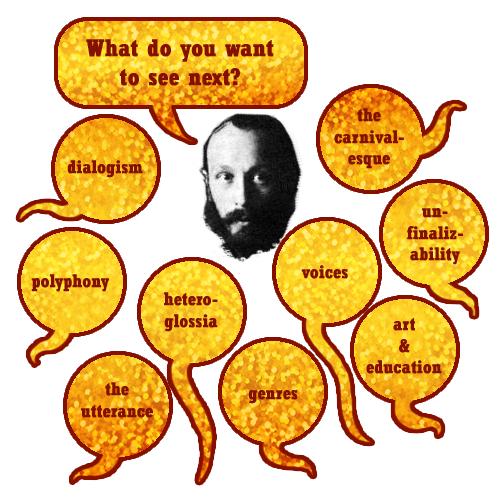

 | ||||
| For Bakhtin, voice is a packet of discourse replete with an ideology.
It is the verbal-ideological perspective expressed within a particular utterance. (Dimitriadis & Kamberelis, 2006, p.52) |
||||
 |
 |
 | |||
|
A voice will always have a particular 'intonation' ('intonatsiya') or 'accentuation'
('aktsentuatsiya'), which reflects the values behind the consciousness which speaks. It should be noted that accentuation is
much more important in Russian than in English, since every Russian word
has its own particular accentuation or stress; in some cases, two words with
the same spelling but different accentuation will have radically different
meanings.
(Roberts, 1994, p. 251) |
||||
 | ||||
Typically for Bakhtin, artforms with multiple voices (polyphony) are acknowledged as better representing the dialogic nature of experience. The exemplar genre of polyphony is for Bakhtin the novel, and he frequently contrasts it with monologic forms such as epic poetry, or academic or didactic speech.
 In David Mazzucchelli's graphic novel Asterios Polyp, each character's distinctive voice is reflected in the shape and typeface of their word balloon. The balloons are formal relfections not only of the literal voice, but of the dialect and ideology of the character. |
||||
 |

Ayers, W., & Alexander-Tanner, R. (2010). To teach: The journey, in comics. New York, NY: Teachers College Press.
Bakhtin, M. M. (1981). Discourse in the novel (C. Emerson & M. Holquist, Trans.). In M. Holquist (Ed.), The dialogic imagination: Four essays by Mikhail Bakhtin (pp. 259-422). Austin, TX: University of Texas Press. (Original work published 1975).
Bakhtin, M. M. (1981). Epic and Novel (C. Emerson & M. Holquist, Trans.). In M. Holquist (Ed.), The dialogic imagination: Four essays by Mikhail Bakhtin (pp. 3-40). Austin, TX: University of Texas Press. (Original work published 1941).
Bakhtin, M. M. (1981). Forms of time and of the chronotope in the novel (C. Emerson & M. Holquist, Trans.). In M. Holquist (Ed.), The dialogic imagination: Four essays by Mikhail Bakhtin (pp. 84-258). Austin, TX: University of Texas Press. (Original work published 1937).
Bakhtin, M. M. (1984). From Rabelais and his world (H. lswolsky, Trans.). In P. Morris (Ed.), The Bakhtin reader (pp. 195-244). New York, NY: Oxford University Press. (Original work published 1965).
Bakhtin, M. M. (1984). Problems of dostoevsky's poetics. (C. Emerson, Trans.). Minneapolis, MN: University of Minnesota Press. (Original work published in 1963).
Bakhtin, M. M. (1986). From speech genres and other late essays (H. lswolsky, Trans.). In P. Morris (Ed.), The Bakhtin reader (pp. 81-87). New York, NY: Oxford University Press. (Original work published 1976).
Cuenca, A. (2010). Democratic means for democratic ends: The possibilities of Bakhtin's dialogic pedagogy for social studies. The Social Studies, 102(1), 42-48.
Dimitriadis, G., & Kamberelis, G. (2006). Theory for education. New York, NY: Routledge.
Miles, A. P. (2010). Dialogic encounters as art education. Studies in art education: A journal of issues and research 51(4), 375-379.
Roberts, G. (1994). A glossary of key terms. In P. Morris (Ed.), The Bakhtin reader (pp. 245-252). New York, NY: Oxford University Press.
Rule, P. (2011). Bakhtin and Freire: Dialogue, dialectic and boundary learning. Educational philosophy and theory 43(9), 924-942.